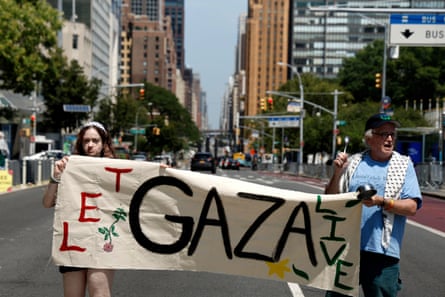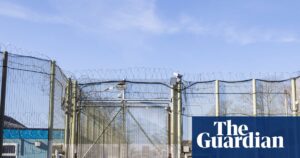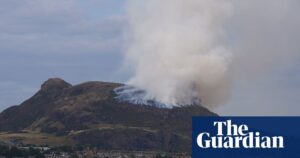Benjamin Netanyahu has defended his plan to take control of Gaza City in the face of widespread international outrage, even as senior UN officials warned that the move risked unleashing “another calamity” on a territory already experiencing “starvation, pure and simple”.
In a rare press conference with foreign journalists in Jerusalem, the Israeli prime minister said the plan, signed off last week by the security cabinet to criticism both at home and abroad, was “the best way to end the war and the best way to end it speedily.”
But during an emergency weekend session of the UN security council in New York, there were repeated warnings that rather than end the 22-month war, the move would exacerbate an already dire humanitarian situation.
“If these plans are implemented, they will likely trigger another calamity in Gaza, reverberating across the region and causing further forced displacement, killings, and destruction,” said UN assistant secretary general, Miroslav Jenca.
Amid the heated rhetoric, Gaza’s health ministry said that five more people, including two children, had died of malnutrition-related causes, bringing the number of children who have died from such causes to 100. Including adults, the total death toll from malnutrition stands at 217, the ministry says.
Ramesh Rajasingham, Ocha’s coordination director, told the security council meeting: “This is no longer a looming hunger crisis – this is starvation, pure and simple.”
Israel has imposed a blockade and restrictions on aid entering the territory, but in his press conference Netanyahu said it was “completely false” that his government was pursuing a “starvation policy”. He acknowledged hunger, and problems with the food distribution system run by the US and Israeli-backed Gaza Humanitarian Foundation (GHF), but accused the media of “lies” about the scale of the problem.
A few hours before he spoke, at least 26 Palestinians were killed while seeking aid in Gaza, hospitals and witnesses said. They included 15 killed while waiting for aid trucks close to the newly built Morag corridor that separates the southern cities of Rafah and Khan Younis, according to Nasser hospital.
A further six were killed while waiting for aid in northern Gaza near the Zikim crossing, according to Gaza’s health ministry and Shifa hospital in Gaza City.
According to the UN, more than 1,370 Palestinians have been killed since 27 May while seeking food. Netanyahu did not take responsibility for the killings and said, without providing evidence, that “a lot of the firing was done by Hamas”. The Israeli military has repeatedly claimed Hamas is stealing aid, despite the European Commission finding no reports of this.
Except on organised and controlled “embeds” of a few hours alongside Israeli soldiers, international journalists have not been allowed into Gaza since the Hamas attacks of 7 October 2023, when about 1,200 people, mostly Israeli civilians, were killed and more than 250 people were taken hostage.
Families of the remaining hostages have also criticised the plan, and many were among tens of thousands of people who marched on Israel’s military headquarters in Tel Aviv on Saturday. The plan has also opened a rift between Netanyahu and the IDF leadership, but has not been opposed by the Trump administration, Israel’s most important backer.
Israel says Gaza City and nearby areas are home to two remaining Hamas strongholds.
“We have about 70 to 75% of Gaza under Israeli control, military control. But we have two remaining strongholds. These are Gaza City and the central camps in Al Mawasi,” Netanyahu told reporters.
“Given Hamas’s refusal to lay down its arms, Israel has no choice but to finish the job and complete the defeat of Hamas”, Netanyahu said, adding he expected the operation to begin “fairly quickly”.
Hamas says it will not disarm unless an independent Palestinian state is established.
Netanyahu pushed back against what he called a “global campaign of lies”. “We will win the war, with or without the support of others,” he added.
Britain, a close ally of Israel which nonetheless pushed along with others for the emergency meeting, warned in New York that Netanyahu’s plan risked prolonging the conflict.
“It will only deepen the suffering of Palestinian civilians in Gaza. This is not a path to resolution. It is a path to more bloodshed,” said British deputy ambassador to the UN, James Kariuki.
Algeria’s ambassador, Amar Bendjama, called for sanctions on Israel in response to its Gaza City plan. “The hour has come to impose sanctions on the enemy of humanity,” he said. The Palestinian envoy, Riyad Mansour, said: “If it was another country, you would have been imposing sanctions a long time ago.”
However, the US, a veto-wielding permanent member of the security council, offered support for Israel and accused those nations who supported Sunday’s meeting of “actively prolonging the war by spreading lies about Israel”.
“Israel has a right to decide what is necessary for its security and what measure measures are appropriate to end the threat posed by Hamas,” said the US envoy to the UN, Dorothy Shea.
Israel’s military offensive has killed at least 61,000 Palestinians, according to Gaza’s health ministry, most of them civilians. The figure does not include the thousands believed to be buried under rubble or the thousands killed indirectly as a consequence of the war.
Israel’s deputy ambassador to the UN, Jonathan Miller, said: “Pressure should not be placed on Israel, who suffered the most horrific attack against the Jewish people since the Holocaust, but on Hamas.”










